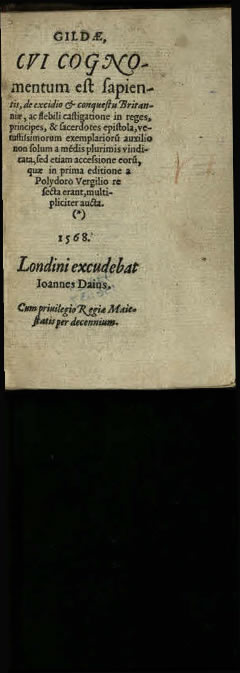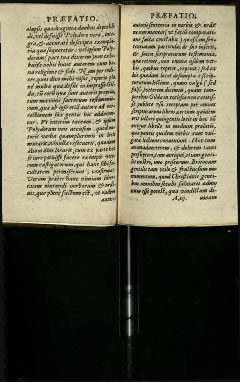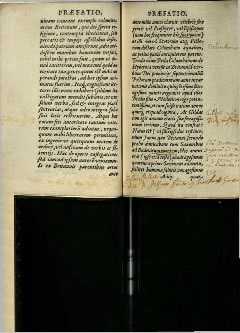Gildas
You may click on the thumbnail images to view them full screen
Gildas (516?-570?), Gildæ, cui cognomentum est sapientis, de excidio & conquestu Britanniæ, ac flebili castigatione in reges, principes, & sacerdotes epistola: vetustissimorum exemplarioru[m] auxilio non solum a me[n]dis plurimis vindicata, sed etiam accessione eoru[m], quæ in prima editione a Polydoro Vergilio refecta erant, multipliciter aucta Londini excudebat Ioannes Daius. Cum priuilegio Regiæ Maiestatis per decennium
[London: Ioannes Daius, 1568]

This item from the Flintshire Harries Collection represents a later reprint of Polydore Vergil's edition of Gildas's De excidio & conquestu Britanniae. It attests to the enduring interest in early British history among early modern readers, also showing that Vergil's initiative in bringing this text to the attention of his fellow scholars had been salutary in the preservation of the earliest extant sources for pre-Conquest British history.

Gildas (516?-570?), Opus novum. Gildas Britannus monachvs ... De calamitate excidio, & conquestu Britanniæ, quam Angliam nunc vocant: author vetustus a multis diu desyderatus, & nuper in gratiam .D. Cutheberti Tonstalli, Londinen. Episcopi formulis excusus
[Londini: s.n., 1525]
One of the earliest printed books in Bangor's Rare Books Collection, this copy of Gildas's De excidio & conquestu Britanniae (The Ruin and Conquest of Britain) was edited by Tudor historian Polydore Vergil from two manuscripts, one of which was lent to him by Bishop Tunstall, with the assistance of Robert Ridley of the Bishop's staff, as outlined in the preface. The book is dated 25 March 1525 at the end. This is the first edition; it contains marginal notes in an early modern hand.
Gildas or St. Gildas was a monk and chronicler, yet little is known about his life. In De excidio & conquestu Britanniae he states that his birth occurred in the year of the siege of 'Mons Badonicus' (the Battle of Mount Badon, where the historical Arthur is said to have been victorious against the Saxons); thus his text was written forty-three years and one month after this battle. However, Gildas does not mention Arthur by name in his work.
Polydore Vergil (c. 1470-1555) was an Italian humanist scholar, historian and diplomat who lived in England most of his life. His most important historical work is Anglica Historia (printed 1534), which influenced historical writing in his period and beyond.

Britannicarum gentium historiae antiquae scriptores tres : Ricardus Corinensis, Gildas Badonicus, Nennius Banchorensis. Recensuit notisque & indice auxit Carolus Bertramus [Havniae [Copenhagen]: Impensis Editoris, 1757] Bangor collection.
This compendium of the earliest historical sources about Arthur brings together Gildas's 6th century De excidio and conquestu Britanniae and Nennius's 9th century Historia Brittonum (History of the Britons). It was compiled by Charles Bertram (1723-65), who prefaced it with his own forgery, a work he titled De situ Britanniae, which he claimed had been copied from a manuscript written by Richard of Cirencester. Bertram's own work and his reprinting enterprise display the appeal of the 'historical' Arthur well into the eighteenth century.

Nennius (770?- 810?) was, like Gildas, a monk; on internal evidence from his Historia Brittonum, some modern scholars believe he may have been the disciple of the bishop of Bangor and his work was composed in Gwynedd. Nennius's Historia remains one of the most important historical sources for the sixth, seventh and later ninth century.